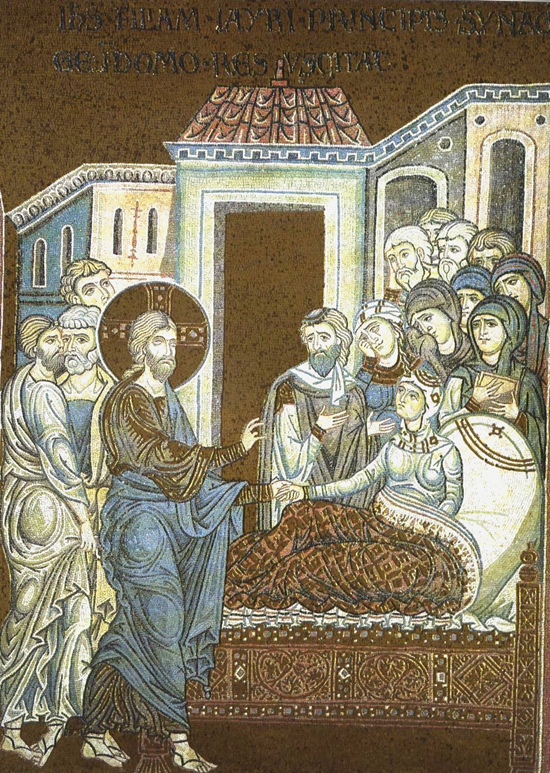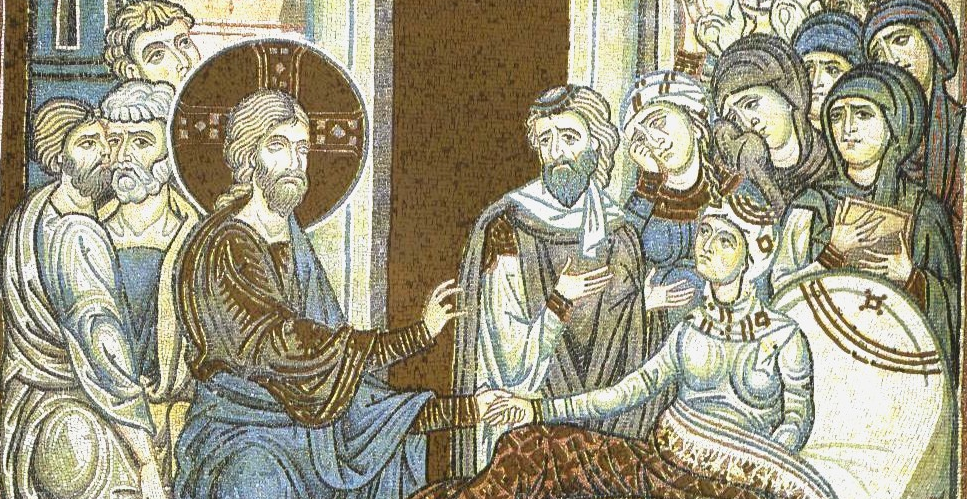Whom Do You Trust?
Thirteenth Sunday Scripture Readings

So many times, as we read the gospels, we’re sorely tempted to think of Jesus as a miracle worker—almost as a magician. The gospel authors did little to dissuade their readers from that opinion. So, we see powerful signs in today’s gospel, and we think that Jesus cured the woman with the hemorrhage and raised Jairus’s daughter from the dead. But was that even the point of the story?
Take, for example, the woman with the hemorrhage. In her desperation, she was convinced that if she but touched Jesus’s cloak, she’d be cured. Yet, apparently, Jesus wasn’t even consciously aware of the woman until she touched his garment. Yes, we’re told that Jesus felt the power flowing through him, but is it really accurate to say that he cured her? Wouldn’t it be more accurate to say that he was the catalyst and channel of God’s healing power for her in response to her faith? Didn’t he say, after all, “Daughter, your faith has saved you?” If we’re to take Jesus at his word, wouldn’t we have to say that it was her faith—her trust in God and in Jesus—that accomplished her healing?
I think it’s critical to understand that, in the gospels, the term “faith” has little to do with beliefs. Jesus never asked anyone what they believed before helping or even associating with them. He required no “articles of faith” nor doctrinal orthodoxy from anyone. In fact, he only criticized those who did—the scribes and Pharisees. What he did require was trust in God and trust in him. He didn’t disparage those with doubts. If he had, there wouldn’t have been any apostles. Instead, those he welcomed and those to whom he offered his help and care were those who trusted him despite their doubts and reached out to him despite their fears. Then, as now, Jesus’s disciples were none but the doubtful and the fearful.
Today’s gospel stories, one nested within the other, are about healing. When we speak of healing, what we really mean is someone being restored to wholeness. When something isn’t whole, it’s broken, whether that thing is a tangible object, or not. As often happens, our understanding of healing is inaccurate. We think that if we restore wholeness and balance to the body, the person will be healed. Even medical science is coming to accept that healing the body without healing the person is ineffective. It’s our life force, our personhood, our identity, our soul that experiences brokenness, and it’s a brokenness that no medicines nor medical procedures can heal.
Think about it … when the woman overcame her doubts and fears and trusted that touching Jesus’s cloak—the cloak of a man who exhibited the power of God—she would be healed. What happened? Yes, of course, “her flow of blood dried up.” But wasn’t there something even more important happening? For twelve years, she’d suffered greatly. She’d gone to many doctors and spent all her resources. Suddenly, all that was at an end. Her fragmented life was restored to wholeness.
Now, consider Jairus, whose daughter was sick and ultimately died. Of course, we read that Jesus raised her up from her deathbed. But where was the trust? Where was the mending of brokenness? The daughter was restored to life, but only to die again, eventually. Didn’t the real healing take place in Jairus himself, whose broken heart was restored? It was his faith, after all, and his brokenness that allowed God’s healing power to flow through Jesus.
Set aside the brokenness of the body. Physical healing cannot be anything other than temporary. With the body, there’ll always be another wound, another illness, another physical breakdown, until age and those factors conspire to put an end to it. It’s the healing of our life force, our personhood, our identity—what we refer to as our soul—that matters. When we talk about trust in God to heal our brokenness, when we talk about salvation, when we talk about overcoming death, that’s what we’re referring to. Trust in God elevates us beyond our doubts, beyond our fears, beyond our brokenness, beyond even death.
What, then, are we looking for this morning as we come together as Church? We are, after all, the Body of Christ. A such, the Church is the catalyst and channel of God’s healing. We come as Jairus and the woman in the gospel did, looking for wholeness, looking for healing from one kind of brokenness or another, for relief from the wounds of our own sinfulness. What will we find if we can only overcome our doubts that God can work through such an institution and our fears that we may be beyond God’s help? As they did, we’ll find wholeness out of our brokenness. We’ll find peace out of our turmoil. We’ll find life out of the threat of death itself.
Get articles from H. Les Brown delivered to your email inbox.
